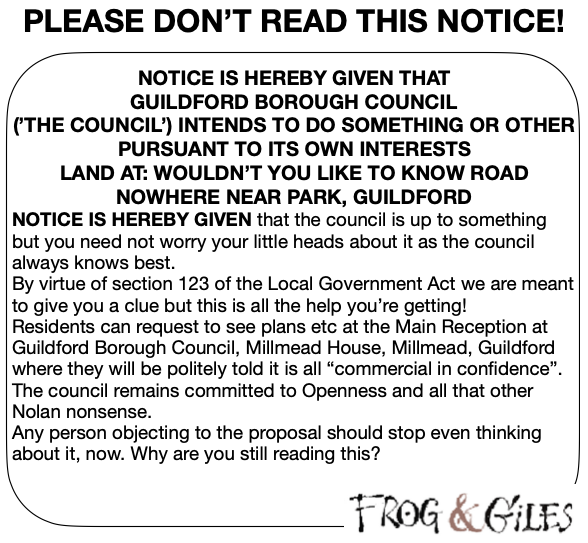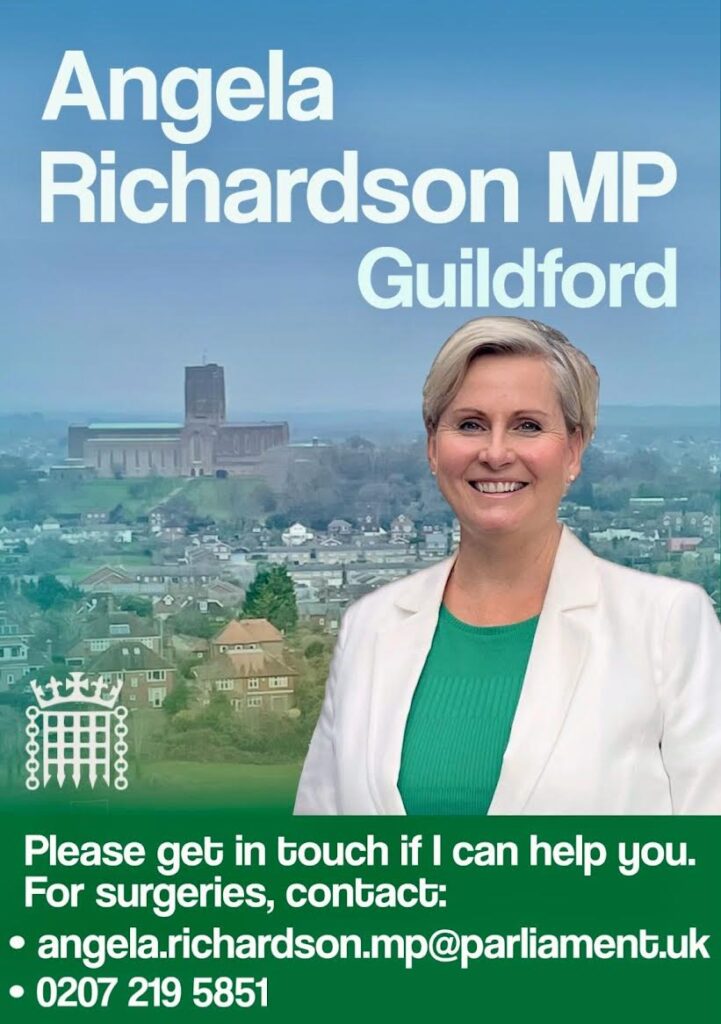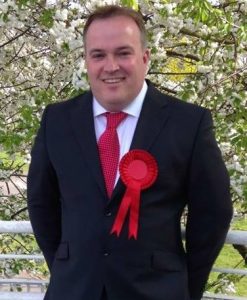 Abraham Lincoln
If given the truth, the people can be depended upon to meet any national crisis...
Abraham Lincoln
If given the truth, the people can be depended upon to meet any national crisis...
 Guildford news...
for Guildford people, brought to you by Guildford reporters - Guildford's own news service
Guildford news...
for Guildford people, brought to you by Guildford reporters - Guildford's own news service
Dragon Interview: James Walsh – New Labour Councillor For Stoke
Published on: 5 Sep, 2016
Updated on: 7 Sep, 2016
James Walsh is the newest councillor on the block at Millmead. He seems to have made a good impression and even some of his political opponents have been heard to say positive things about him. His by-election success doubled the number of Labour councillors at Guildford Borough Council, but it is still just two out of the 48 total.
The Labour party had attracted 17,540 votes across the borough in the 2015 borough election, or 11% of the votes cast, but lost a seat in Westborough, to everyone’s surprise.
In a forthright interview James gives his views on a number of topical questions. Interview conducted by Martin Giles.
You were elected in May this year (2016). Do you feel you have now settled in to your councillor role?
Yes, although it has helped that I have been a councillor before. Guildford presents different challenges and opportunities than Slough, where I was a councillor for six years, but the officers and fellow councillors here have been very welcoming.
Have the issues that have emerged in your Stoke ward been those that you expected, or not?
Yes – parking is the issue that comes up most frequently, especially in Weyfield. There have been some issues that have come from out of the blue, like the current Traveller incursion on the green in Bellfields. I’m finding that one particularly frustrating because there’s a legal process to go through and I can’t abide the selfishness and lack of consideration shown to residents by these people.
As you said, you were previously a councillor for Slough Borough Council. How does GBC compare?
Guildford is a very different borough in terms of diversity and the kind of issues it faces in some respects. Slough is a largely urban unitary authority – equivalent to Surrey County Council in terms of its powers – that is very similar to some London boroughs; Guildford is more a mixture of urban and rural, with the very different pressures and opportunities that presents. Both, however, are charged by national government with providing more housing during the next few decades and I think this will be the defining issue for both in the next decade or two.
Obviously the Local Plan is a major policy issue for all of us in Guildford. What do you think of the draft plan? Should public responses be considered by GBC before submission to the Planning Inspectorate?
I think it’s helpful to finally have a draft plan “out there” that we can all make submissions of support or objection to. It’s recently been out for consultation with the public before submission to the Planning Inspectorate and it’s important that those responses are listened to. The council has a very professional team leading this and I have full confidence that all comments and views will be considered before the final submission at the end of the year. Difficult decisions have to be made about housing and infrastructure, and not everyone will be happy with the final outcome.
Some have said that large “strategic” developments, such as Wisley and Blackwell Farm will not help provide more affordable homes for local people. What do you think?
That depends on what planning applications are agreed by the council in the coming years if those sites are included in the final plan – and I don’t think Wisley will be. It is our job as councillors to make sure that developers do not try and reduce the number of social or affordable houses when applications to develop the sites are submitted – and I feel that there is something close to a cross-party consensus on that in the chamber. However, Labour will be watching this closely and will fight any attempts to build fewer affordable or social houses if these strategic sites become available.
Everyone seems to agree that more social housing is needed. If you were given carte blanche what would you do?
I would increase the amount available in the Housing Grant, which has been cut by recent governments, and I would seek to build a range of affordable housing – from shared ownership properties to affordable rent properties – with a realistic and affordable rent for where we live. I would also explore how other models, such as a housing cooperative, may contribute to the mix.
Do you think the “modal shift” in our transport habits, i.e. switching to more walking, cycling and use of public transport is really possible over the next decade? Is enough being planned to encourage it?
I’m not sure. Ditching your car for alternative means of travel looks good on paper, but in reality…? Public transport is prohibitively expensive and tends to be overcrowded, dirty and rarely on time, the roads feel unsafe to many cyclists and not many of us can walk to work because we work outside the borough. A lot more needs to be done to make alternative travel in the UK safe, sustainable and affordable before I think we will see the kind of shift we need to see. Until then, most people will continue to drive to wherever they need to go.
You are on record as opposing the proposal to have an elected mayor in Guildford. Why do you think it would be any worse than the current “strong leader” model of governance?
I believe the elected mayor model can work in urban centres like London, Liverpool and Manchester, although some areas have since rejected their mayors and have returned to a system similar to the one we have in Guildford now. Guildford is not just an urban borough, with urban issues – much of it is rural with villages that have their own identities and issues.
I believe that boroughs like Guildford are best represented by councillors who know their wards and identify with their local areas. I am also extremely sceptical about the motives behind the forthcoming referendum, which appears to have been driven by a disgraced former councillor who is a convicted forger, a local businessman and a former leader of the council who opposed his own party’s decision to revise the cabinet system of governance in order to improve scrutiny.
As a relative newcomer to Guildford, how important is the town’s historic character? If it is important should more be done to preserve and enhance it?
I grew up in Surrey and have had a strong affinity with Guildford long before I moved here. The history of the borough is extremely important to me – I have two history degrees from Royal Holloway College and I know that understanding, celebrating and learning from our history is an exceptionally important part of maintaining and strengthening our identity.
Guildford is a treasure trove to someone like me – from the oldest synagogue in England beneath [the former] Waterstones to the stories about the Guy Riots and the fayres at St Catherine’s and the massacre of the Saxons on Guildown – there is so much here that we’ve barely tapped into in terms of celebrating our borough. So much of the old historic High Street area has disappeared, especially during what can only be described as the vandalism of the 60s and 70s, that preservation and enhancement of what we have left is one of my key priorities as a local councillor.
That’s why I am pleased about the revised plans for the museum, which should see fantastic changes to the way the existing building is used in conjunction with the castle grounds. There are real opportunities here to show off our history like never before.
Do you think party politics is beneficial to local councils? If so how?
I think it’s healthy to have representation from all parties – and from independents. Despite what may be a common view, the national party system has very little involvement in local politics – our councillors are all local people first, and affiliates of one party or another second. The party system evolved from Georgian factions in Parliament and, at their basic level, provide a means through which like-minded people can work together to achieve common goals. Before that, and in councils run solely by independents, you tended to have a system where “NIMBYism” and pork-barrel haggling was essential to get anything done. Also contrary to popular belief, it is not unusual for councillors from different parties to work together where it makes sense and benefits local people.
The Labour Party in Guildford attracts little voter support why is that? Are two councillors a fair representation of Labour supporters in the borough generally?
An interesting question! The first thing to say is that we live in Surrey, which is not traditionally a hotbed of Labour support. The second thing to say is that Labour increased its share of the vote in the 2015 General Election and won nearly 4,000 more votes than in 2010, so we’re moving in the right direction. I would like to see more Labour councillors elected here and believe that, with some very strong candidates waiting in the wings and an effective campaign team, we have a very good chance of doing that in 2019.
Who are you supporting in the Labour leadership election and why?
Britain is changing all the time and the old certainties are now uncertainties in so many areas of life, including politics. To stand any chance of winning a general election, Labour needs a leader who can reach beyond the traditional “core vote” and speak up for the aspirations, hopes and dreams of the majority of people in the country. I have voted for Owen Smith because I believe that he is the only candidate who at least understands that.

See Dragon story: GBC’s Explanation of Major Land Sale Notice Error ‘Borders on Arrogant’ Says Councillor




Recent Articles
- Surrey Children’s Services Improvement Recognised by Ofsted
- Independent Guildford Stationers Are ‘Top of the Shops’
- Birdwatcher’s Diary No.304
- Cyclist Dies in Peaslake
- Surviving Strategic Director Quits to Take Up CEO Role with a West Sussex Council
- Letter: Damning Reports Should Not Be Used to Gain Political Advantage
- New Leader of the Opposition at Waverley
- Surrey Day’s Celebrations Took to the Skies
- Notice: Dance with Junction 9 to Raise Money for Charities
- Mistreated Former Sub-postmasters Receive Standing Ovation


Search in Site
Media Gallery
Dragon Interview: Local Artist Leaves Her Mark At One of England’s Most Historic Buildings
January 21, 2023 / No Comment / Read MoreDragon Interview: Lib Dem Planning Chair: ‘Current Policy Doesn’t Work for Local People’
January 19, 2023 / No Comment / Read MoreA3 Tunnel in Guildford ‘Necessary’ for New Homes, Says Guildford’s MP
January 10, 2023 / No Comment / Read More‘Madness’ for London Road Scheme to Go Ahead Against ‘Huge Opposition’, Says SCC Leader
January 6, 2023 / No Comment / Read MoreCouncillor’s Son Starts Campaign for More Consultation on North Street Plan
December 30, 2022 / No Comment / Read MoreCounty Council Climbs Down Over London Road Works – Further ‘Engagement’ Period Announced
December 14, 2022 / No Comment / Read MoreDragon Interview: GBC Reaction to the Government’s Expected Decision to Relax Housing Targets
December 7, 2022 / No Comment / Read MoreHow Can Our Town Centre Businesses Recover? Watch the Shop Front Debate
May 18, 2020 / No Comment / Read More







Recent Comments